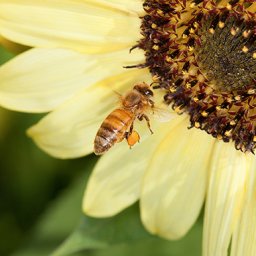
ARS News Service
Kim Kaplan
October 1, 2021, Baton Rouge, La.- Honey bees could be intentionally bred to thrive on plants that are already locally present or even solely on artificial diets, according to a recent U.S. Department of Agriculture Agricultural Research Service (ARS) study.
ARS researchers found individual bees respond differently to the same diet and that there is a strong genetic …
BELTSVILLE, Md., June 22, 2021 – Researchers at the U.S. Department of Agriculture’s (USDA) Agricultural Research Service (ARS) have found that a component in almond nectar and pollen can reduce honey bee viruses and gut parasites, which are some of the leading threats to bee health and colonies.
The study, published in the journal Insects, showed amygdalin — a naturally-occurring chemical …

Honey Bee Health Coalition Publishes Guide Documenting How Commercial Beekeepers Keep Healthy Hives without Consistent Use of Off-label Varroa Treatments
DENVER, CO, Keystone Policy Center – Commercial beekeepers are finding success treating Varroa, a parasitic mite that kills honeybees, in their hives without relying exclusively on off-label chemical treatments, according to a guide published this week by the Honey Bee Health Coalition. …
BELTSVILLE, MARYLAND, February 18, 2021—An Agricultural Research Service entomologist has discovered the Nosema ceranae parasite that causes major problems and death in honey bees works by hijacking its host's iron for itself.
Iron is as essential a micronutrient for honey bees as it is for people. Honey bees usually get enough to meet their needs from their flower pollen diet. They …

OLYMPIA – The Washington State Department of Agriculture (WSDA) trapped its first Asian giant hornet this month.
The hornet was found in a WSDA trap set near Birch Bay in Whatcom County. WSDA trappers checked the bottle trap on July 14 and submitted the contents for processing at WSDA’s entomology lab. The hornet was identified during processing on July 29. This …

Beginning in March 2020, EPA’s Office of Pesticide Programs will host a series of public webinars highlighting ongoing work to promote pollinator health and habitat.
These webinars seek to increase awareness of the evolving science on pollinator health, promote efforts to improve pollinator habitat, and engage stakeholders in addressing factors associated with declines in pollinator health.
Each webinar will target different stakeholders, …

ARS News Service
By Kim Kaplan
TUCSON, ARIZONA, September 18, 2019—A new tool from the Agricultural Research Service (ARS) can predict the odds that honey bee colonies overwintered in cold storage will be large enough to rent for almond pollination in February. Identifying which colonies which colonies will not be worth spending dollars to overwinter can improve beekeepers' bottom line.
Beekeepers have been …

ARS News Service
By Jan Suszkiw
MADISON, WISCONSIN, August 20, 2019—Bees only feast on nectar and pollen, right?
Wrong. Turns out, Nature's famously busy insect isn't strictly vegan, after all.
Reporting online in this month's American Naturalist, a team of Agricultural Research Service (ARS) and university scientists has shown that bee larvae (brood) have a taste for "microbial meat."
ARS entomologist Shawn Steffan and his …





